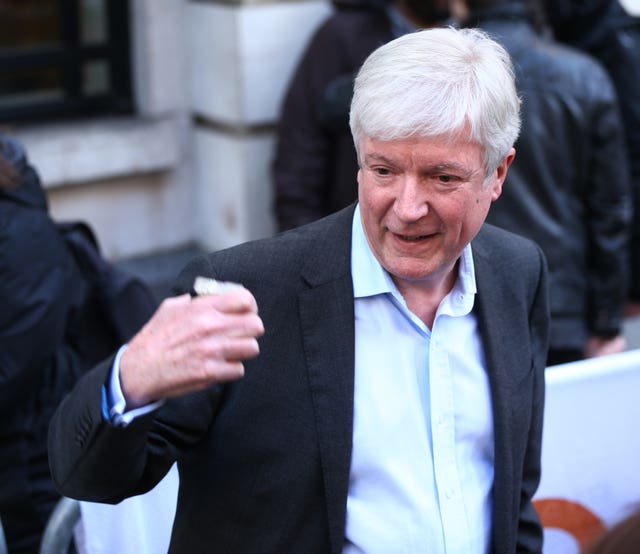
The cost of the BBC licence fee is set to rise by £4 to £154.50.
The Government, which sets the level of the licence fee, announced in 2016 that it would increase in line with inflation for five years from April 1 2017.
This means the cost of the licence will go up from £150.50 to £154.50 from April 1, the BBC said.
The announcement comes as free TV licences for over-75s are being reviewed.
The broadcaster has launched a consultation on the issue but warned that the cost of continuing to provide free TV licences for over-75s would “fundamentally change the BBC”.
The corporation took over the cost from the Government as part of its charter renewal negotiations.
The Government-funded scheme, which provides free TV licences to older viewers, comes to an end in June 2020.
 BBC Director-General Tony Hall (Yui Mok/PA)
BBC Director-General Tony Hall (Yui Mok/PA)
Age UK recently claimed that as many as 50,000 UK pensioners could be pushed below the poverty line if the free TV licence is scrapped.
The BBC said: “The new licence fee amount equates to just £2.97 a week or £12.87 a month, for which the BBC provides nine national TV channels plus regional programming, 10 national radio stations, 40 local radio stations plus dedicated Nations radio services, one of the UK’s most popular websites, the radio app BBC Sounds, and BBC iPlayer.”
It added: “Programmes last year included Strictly Come Dancing, Killing Eve, Bodyguard, Dr Who, Peter Kay’s Car Share, David Attenborough’s Dynasties, EastEnders, Match Of The Day, and coverage of Wimbledon and the World Cup.”
The BBC, which announced a new natural history series with Sir David Attenborough on Thursday night, has faced controversy over the use of personal service companies for its stars and the gender pay gap.
Since the furore over talent pay, Zoe Ball has taken over from Chris Evans, who had been one of the BBC’s biggest earners, on Radio 2’s Breakfast Show, while Fiona Bruce landed the role of Question Time host.
TV Licensing defended plans to spend at least £1.7 million of BBC licence fee-payers’ money on external PR agencies to promote the annual charge.



Why are you making commenting on The Herald only available to subscribers?
It should have been a safe space for informed debate, somewhere for readers to discuss issues around the biggest stories of the day, but all too often the below the line comments on most websites have become bogged down by off-topic discussions and abuse.
heraldscotland.com is tackling this problem by allowing only subscribers to comment.
We are doing this to improve the experience for our loyal readers and we believe it will reduce the ability of trolls and troublemakers, who occasionally find their way onto our site, to abuse our journalists and readers. We also hope it will help the comments section fulfil its promise as a part of Scotland's conversation with itself.
We are lucky at The Herald. We are read by an informed, educated readership who can add their knowledge and insights to our stories.
That is invaluable.
We are making the subscriber-only change to support our valued readers, who tell us they don't want the site cluttered up with irrelevant comments, untruths and abuse.
In the past, the journalist’s job was to collect and distribute information to the audience. Technology means that readers can shape a discussion. We look forward to hearing from you on heraldscotland.com
Comments & Moderation
Readers’ comments: You are personally liable for the content of any comments you upload to this website, so please act responsibly. We do not pre-moderate or monitor readers’ comments appearing on our websites, but we do post-moderate in response to complaints we receive or otherwise when a potential problem comes to our attention. You can make a complaint by using the ‘report this post’ link . We may then apply our discretion under the user terms to amend or delete comments.
Post moderation is undertaken full-time 9am-6pm on weekdays, and on a part-time basis outwith those hours.
Read the rules hereLast Updated:
Report this comment Cancel